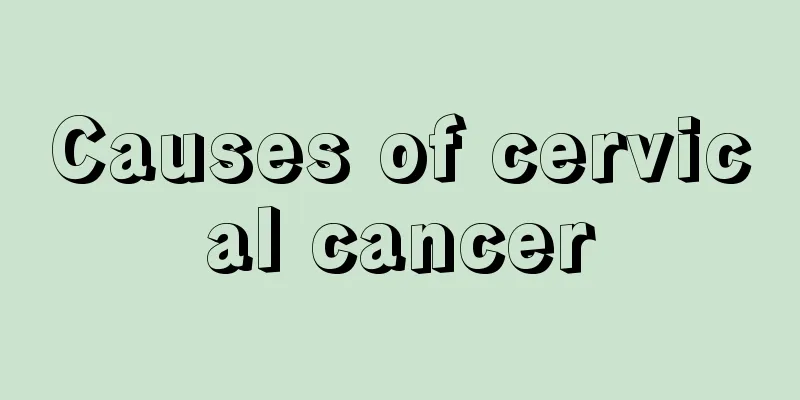Causes of cervical cancer

|
The occurrence of cervical cancer is usually related to genetic, environmental and physiological factors. Its main cause includes persistent infection with human papillomavirus (HPV), which is the most clear and common pathogenic factor. Genetic factors and the strength of the immune system also affect the occurrence and development of the disease to a certain extent. Human papillomavirus (HPV) infection is considered the most important external trigger for cervical cancer. Most sexually active women may be infected with HPV at some stage, and factors such as underage sex, multiple sexual partners, and failure to practice safe sex can increase the risk of infection. Although HPV infection is very common, not all infected people will develop cervical cancer. Only persistent infection with high-risk HPV will lead to cancer. Genetic and immune factors play a supporting role in the development of cervical cancer. Studies have shown that certain genotypes may make women more susceptible to the carcinogenic effects of HPV. People with weakened immune systems (such as those infected with HIV or those taking immunosuppressive drugs for a long time) also face a higher risk of cervical cancer. Other related factors include smoking, long-term use of oral contraceptives, etc., which may increase the risk of cervical cancer by weakening the immune system or causing abnormal cell changes. Human papillomavirus (HPV) infection is considered the most important external trigger for cervical cancer. Most sexually active women may be infected with HPV at some stage, and factors such as underage sex, multiple sexual partners, and failure to practice safe sex can increase the risk of infection. Although HPV infection is very common, not all infected people will develop cervical cancer. Only persistent infection with high-risk HPV will lead to cancer. Genetic and immune factors play a supporting role in the development of cervical cancer. Studies have shown that certain genotypes may make women more susceptible to the carcinogenic effects of HPV. People with weakened immune systems (such as those infected with HIV or those taking immunosuppressive drugs for a long time) also face a higher risk of cervical cancer. Other related factors include smoking, long-term use of oral contraceptives, etc., which may increase the risk of cervical cancer by weakening the immune system or causing abnormal cell changes. In order to effectively prevent cervical cancer, it is recommended to pay attention to the following points: regular cervical screening (such as Pap smear or HPV test) is an important means of early detection of potential precancerous lesions, especially for women over 30 years old; HPV vaccination can significantly reduce the incidence of cervical cancer, and it is usually recommended to be vaccinated between the ages of 12-26 to obtain the greatest benefit before sexual activity; maintaining a healthy lifestyle, avoiding premature or unsafe sexual behavior as much as possible, reducing tobacco and alcohol intake, strengthening physical exercise, and improving immunity can all help reduce the risk of cervical cancer. If abnormal bleeding, long-term pelvic pain or other suspicious symptoms occur, you should seek medical attention in time to get professional medical advice and treatment. |
<<: Are the early symptoms of colon cancer obvious?
>>: Symptoms of thyroid cancer invading the throat
Recommend
Can renal hamartoma cause low back pain?
Renal hamartoma can cause low back pain. In addit...
How to preserve kiwi fruit when it becomes soft
When kiwi fruit becomes soft, it means it is full...
What causes rectal cancer
Rectal cancer refers to the cancer between the ju...
The efficacy and function of clover
Speaking of five-leaf clover, the first thing tha...
Liquid foundation can be poured into the air cushion
Many people will have a problem after using the a...
What to do if you get angry after taking kidney-tonifying Chinese medicine
Winter is a good season for kidney nourishment. T...
What to do if your lips are dry and flaky
Many people often feel that their mouths are part...
What is coagulation disorder?
Coagulation disorder is a functional disease. Whe...
Is it better to do an X-ray on an empty stomach or after a meal?
X-ray examination is a frequently used examinatio...
What to do if you have bloating after chemotherapy for nasopharyngeal carcinoma
What should I do if I have bloating after chemoth...
The banana changed color after being mashed into paste
Many fruits can be used to make fruit jams, such ...
What are the easiest ways to open your throat?
Opening the throat is what we call opening the vo...
What are the precautions for rotavirus vaccination?
As for vaccines, they are now mainly divided into...
How to treat advanced liver cancer
How to treat advanced liver cancer? Liver cancer ...
Can I still eat olive oil after it’s expired for several months?
Some families buy olive oil, but because they don...









